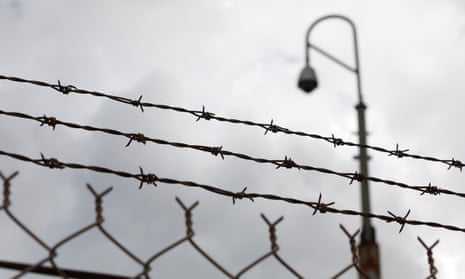The United Nations’ anti-torture watchdog has issued a blunt warning to the Australian government for dragging its feet after a failure to update progress on improving the treatment of detainees across state prisons and immigration detention facilities.
It comes almost a year and a half after a separate but related UN human rights body suspended a tour of Australian detention facilities in October 2022 after it was denied entry to facilities, accusing the country of a “clear breach” of its obligations under Optional Protocol to the Convention Against Torture (Opcat).
The federal government was handed a series of recommendations to improve the rights of detainees or risk being placed on a human rights blacklist alongside such countries as South Sudan and the Democratic Republic of the Congo.
In a separate visit a month later, in November 2022, the UN’s primary anti-torture watchdog – the committee against torture – inspected the general conditions in Australia’s immigration and youth detention centres, putting the country’s detention regime on notice with a series of recommended improvements.
Australia was required to deliver a follow-up report in November last year, covering the implementation of those changes across three areas – general detention conditions, immigration detention and youth detention.
The report recommended Australia repeal mandatory detention laws, introduce time limits on how long someone can be held in detention for immigration issues and offer an independent complaints mechanism for detainees.
On youth detention, it also recommended raising the minimum age of criminal responsibility, prohibiting the use of force and physical constraints on children and immediately ending the use of solitary confinement.
The UN had also implored Australia to provide “all necessary assurances” for the Opcat subcommittee to be able to resume its visit “as soon as possible”.
But a letter sent to the Albanese government on Tuesday by the United Nations rapporteur, Bakhtiyar Tuzmukhamedov, said the follow-up report due in November 2023 had not been handed over and the UN was now seeking clarification.
“The information sought by the committee has not been provided yet, although more than one year has elapsed since the transmittal of the committee’s concluding observations,” the letter said.
“Accordingly, I would be grateful for clarification as to the current status of your government’s responses on the matters, and as to when the information requested will be forthcoming.
“Upon receipt of this information, the committee will be able to assess whether further action is needed.”
A spokesperson for the attorney general’s department said the drafting of the follow-up report “extended beyond” the UN’s “preferred submission date” of 25 November 2023.
“The delay was caused by the need to accommodate adequate stakeholder consultation with all relevant commonwealth agencies and states and territories,” the spokesperson said. “The report is expected to be submitted to the committee shortly.”
The Greens senator, David Shoebridge, had asked the department in a Senate estimates hearing in February about the follow-up report’s status. The department’s assistant secretary, Petra Gartmann, said it was “very close to being provided”.
after newsletter promotion
“The reason for the delay relates to our efforts to seek input from jurisdictions and also from relevant commonwealth agencies, which took longer than expected,” she said.
The UN’s committee against torture monitors whether countries signed up to the body’s Convention Against Torture – which Australia signed in 1989 – are complying with the rules.
Under the Turnbull government, Australia also signed the UN’s Opcat treaty after the 2016-17 royal commission into juvenile detention in the NT, which was sparked by revelations of abuses at the Don Dale youth detention centre. The UN subcommittee on the prevention of torture’s job is to conduct surprise visits to prisons and detention centres of countries to ensure they are abiding the protocols.
The treaty requires states and territories to designate independent bodies – called national preventive mechanisms – to act as domestic watchdogs and inspect places of detention like prisons, youth justice facilities and police cells.
Australia’s three most populous states – NSW, Victoria and Queensland – are yet to designate their bodies amid a funding dispute with the commonwealth over their establishment.
In January, a number of Victorian and federal human rights groups wrote to the state attorney general, Jaclyn Symes, urging the Victorian Labor government to end its funding fight and implement Opcat-compliant monitoring.
“We are aware that the position of the Victorian government is that the federal government, as signatory to the protocol, should provide funding for independent detention oversight,” the groups’ letter said.
“This funding standoff must end. While we wait, a generation of children are languishing behind bars and remain at risk of further harm.”
In May, the Queensland government passed laws removing legislative barriers that prohibited UN officials from visiting places of detention.
